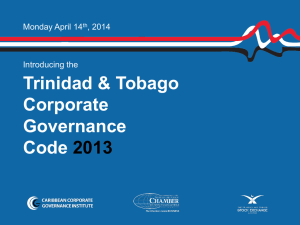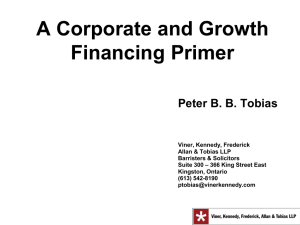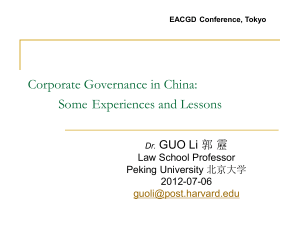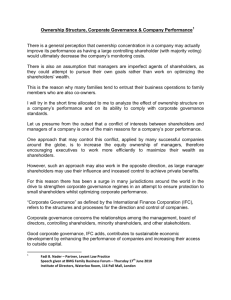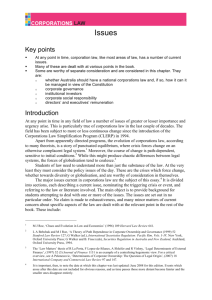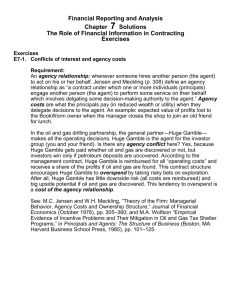Final Examination
advertisement
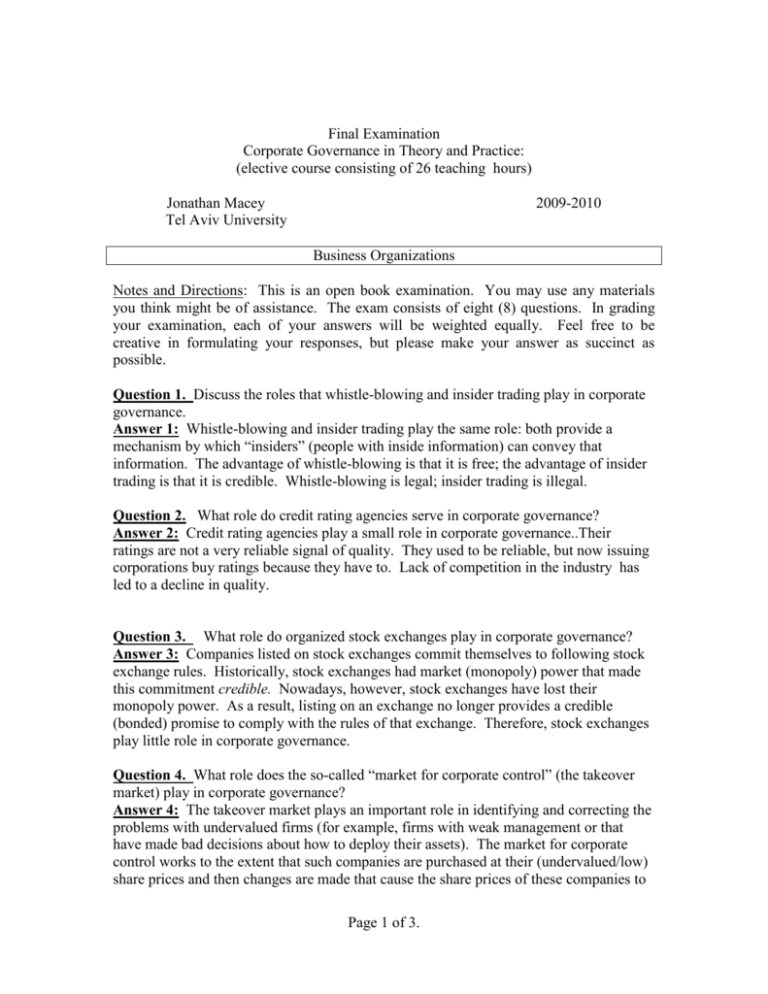
Final Examination Corporate Governance in Theory and Practice: (elective course consisting of 26 teaching hours) Jonathan Macey Tel Aviv University 2009-2010 Business Organizations Notes and Directions: This is an open book examination. You may use any materials you think might be of assistance. The exam consists of eight (8) questions. In grading your examination, each of your answers will be weighted equally. Feel free to be creative in formulating your responses, but please make your answer as succinct as possible. Question 1. Discuss the roles that whistle-blowing and insider trading play in corporate governance. Answer 1: Whistle-blowing and insider trading play the same role: both provide a mechanism by which “insiders” (people with inside information) can convey that information. The advantage of whistle-blowing is that it is free; the advantage of insider trading is that it is credible. Whistle-blowing is legal; insider trading is illegal. Question 2. What role do credit rating agencies serve in corporate governance? Answer 2: Credit rating agencies play a small role in corporate governance..Their ratings are not a very reliable signal of quality. They used to be reliable, but now issuing corporations buy ratings because they have to. Lack of competition in the industry has led to a decline in quality. Question 3. What role do organized stock exchanges play in corporate governance? Answer 3: Companies listed on stock exchanges commit themselves to following stock exchange rules. Historically, stock exchanges had market (monopoly) power that made this commitment credible. Nowadays, however, stock exchanges have lost their monopoly power. As a result, listing on an exchange no longer provides a credible (bonded) promise to comply with the rules of that exchange. Therefore, stock exchanges play little role in corporate governance. Question 4. What role does the so-called “market for corporate control” (the takeover market) play in corporate governance? Answer 4: The takeover market plays an important role in identifying and correcting the problems with undervalued firms (for example, firms with weak management or that have made bad decisions about how to deploy their assets). The market for corporate control works to the extent that such companies are purchased at their (undervalued/low) share prices and then changes are made that cause the share prices of these companies to Page 1 of 3. increase. Problems with the market for corporate control, from a corporate governance perspective are: (1) it is “lumpy” that is because of transaction costs, a company has to be significantly undervalued before it is cost-effective to launch a takeover bid for that company; (2) the market for corporate control only works with a company’s share price is undervalued (lower than it could be); not when a company’s share price is overvalued (higher than it should be), because you can’t make profits buying shares in a company that are already overvalued (too high). Question 5. What role do boards of directors serve in corporate governance? Answer 5: boards of directors are in theory responsible both for monitoring the corporation and for managing it. This dual role causes conflict: it is difficult if not impossible for directors to monitor managers’ decisions because directors and managers make important decision jointly. Directors are susceptible to capture which makes them less able to monitor effectively. Question 6. What differences, if any, are there between treating the corporation as a “nexus of contracts” (Coase) and treating the corporation as a “nexus of promises”? Answer 6: contracts are enforceable. To the extent that a corporation is a nexus of contracts then shareholders should be able to enforce their rights under such contracts. Promises are mere assertions that are unenforceable and are only credible to the extent that the party to whom the promise is made trusts the person making the promise. Companies make contracts with various constituencies such as managers, workers, banks suppliers and customers. Companies make promises to their shareholders. Companies’ relationships with their shareholders (equity investors) is more like a contract than it is like a promise. Question 7. Which of the following parties generally has the most management rights? Briefly explain your answer. A. Minority shareholder in a closely-held corporation. B. Limited partner in a general partnership. C. Member of a limited liability company. D. Limited partner in a limited partnership. Answer: Member of a limited liability company (C). Minority shareholders in closelyheld corporations have no management rights so (A) is wrong; Limited partners in general partnerships don’t exist (there is no such thing), so (B) is wrong; Limited liability partners in a limited partnership do not have management rights, the general partner does, so (D) is wrong.. Page 2 of 3. Question 8. Which of the following statements is more or less correct regarding debt and common shares of a corporation? Briefly explain your answer. A. Neither common shareholders nor debt holders actually the corporations in which they have invested. However, the interests of common shareholders are somewhat more like ownership interests than the interests of debt holders. B. However, the interests of common shareholders are more like ownership interests than the interests of debt holders. C. Both common shareholders and debt holders have an ownership interest in the corporation but the details of their ownership interests differ in certain ways. D. Common shares typically have a fixed maturity date, but debt does not. E. Common shares have a higher priority on liquidation than debt. Answer 8: (A). debtholders are not owners, so b is wrong and C and D are clearly false. Page 3 of 3.



